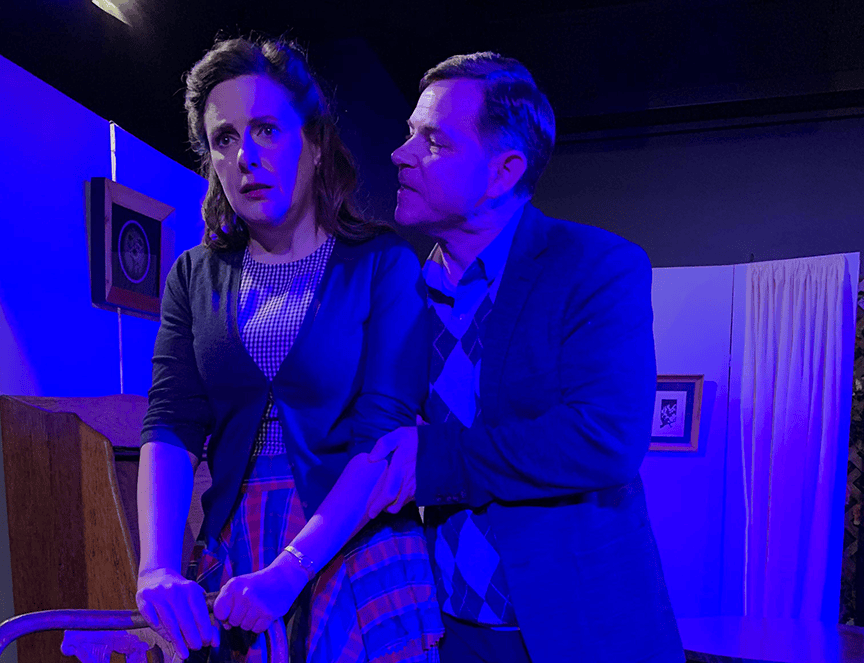
SPOILER ALERT:
We would hate to ruin the ending for you.
Start reading
Agatha Christie’s The Stranger today (US/UK).
_
Was Enid Bradshaw a murderer? The question is certainly a point of heated debate in the newly released The Stranger (2017), which Dame Agatha Christie herself adapted for the stage from her short story Philomel Cottage. At the very least, the author left ample evidence for doubt.
How could a protagonist of a Christie thriller, a heroine by virtue of her survival, be guilty of such wanton disregard for human life? Could sweet Enid, however emotionally intangible, have snuffed out the lives of two former husbands who only meant to provide for her? More urgently, could she have had the illicit forethought to poison her most recently wedded husband’s coffee?
Whether or not Christie deliberately leaves leeway for interpretation, audiences seem to be conscious of the rhetorical nature of fiction with respect to The Stranger. Per engagement with iTheatre Saratoga patrons following our performances of the thriller earlier this year—and some flippant commentary on their way out—the suppositions and verdicts were plentiful. In essence, there are two schools of thought according to those who weighed in across a very multi- generational spectrum (+/- 70-year range). Either Enid spontaneously weaves a tale of crime and opportunity in order to save or prolong her life—à la Scheherazade, or she is precisely the person she purports to be in her 20th century British rendering of the Arabian Nights.
Enid narrates about her life before Strange, and her history of twice marrying smitten older men and then administering toxic cocktails in order to get the insurance money, but we can never be quite confident of the reliability of her account. This we know for sure: Gerald Strange is dead by the end of the play. Because Enid killed him or, alternately, because he is so overcome with fear and surprise at the mere thought of being bested by a woman that his heart gives out. Whatever the ultimate cause of his demise, Enid has managed to defy the man who has taken possession of her modest yet ample financial legacy and, more critically, her physical being. Gerald admits to manipulating her sexuality, her feminine vulnerability, and the institution of marriage. And yet, he does not achieve his absolute conquest. Enid’s ingenuity and her intrinsic drive to live freely, fully, and by any means necessary are essential to her salvation. The woman saves herself in this one.
Even if Enid made the whole thing up, if there were no former victims, it is still plausible that Gerald did not actually succumb to his dubious cardiac condition. She may have tainted Gerald’s beverage in a fraught attempt to vanquish her foe while he waxed poetic about his own remarkableness and she watched her potentially last few minutes on earth tick away.
Despite the throwaway and incidental indication of Gerald Strange’s defective heart, and further disregarding the vindication bestowed upon Enid by former-fiancée Dick Lane’s invulnerable commitment, some observers conclude that Enid did indeed commit the offenses she divulged to her doomed spouse in the final minutes of his life. The most devastating for Gerald Strange was Enid’s singularly straightforward pronouncement, “I poisoned you.” Several male audience members retreated to the parking lot after the show and vocally refused to finish the complimentary coffee they accepted during intermission, which broadly suggested, “Drinking coffee isn’t safe.” No utterance the likes of “I should probably never try to murder my wife,” was heard, mind you. In its place was simply the inference that one should obviously avoid libations with such gross potential for adulteration. Maybe for these wary types, Gerald Strange is precisely what Enid deserved. She may have received penance in sharing a bed with a veritable psychopath. And maybe she gets away with murder yet again.
On the other hand, some would not accept that a woman with whom they have come to empathize is capable of cold-blooded, calculated murder and has somehow avoided culpability. Enid alleges her former neighbors were taken in by the impression of her guileless devotion, but sophisticated theatergoers may be reticent to acknowledge such deception. It’s more plausible for them to assume that Enid possesses such astonishingly flawed judgment so as to eschew the safety of a sensible marriage in order hitch her wagon to a serial killer after just a brief encounter. These things happen! As for Gerald, the fact that he can no longer terrorize naïve women is enough to ease them into a happy ending; it is of little consequence how he met his right and proper fate.
There are, of course, many winding roads to explore in our comprehension of Enid, and of Agatha. And for that matter, in our consideration of each of The Stranger’s small but essential cast of archetypal characters. Can a woman of Agatha Christie’s era find redemption in the wake of homicide, however justifiable? Can current audiences sanction her exploits in light of our contemporary hindsight? We modern types (and Christie herself) may want to suppose that a woman can be in possession of latent acutely-veiled creativity and intelligence ample enough to overwhelm even the most hardened, practiced, and maniacal antagonist. By hook or by crook. By clever words or cunning deeds.
At the core of the narrative are the crossroads: either Enid is or is not a predicate murderer and either she did or did not intentionally exterminate Gerald Strange.
So, which is it? Lucky for us, Dame Agatha leaves us room enough to dangle the questions. Enjoy your coffee.
_
Discover even more by visiting the Agatha Christie Collection (US/UK).

“The Impossible Dream” – An Anthem of Hope

In the Spirit: Plays and Musicals Based on A Christmas Carol

